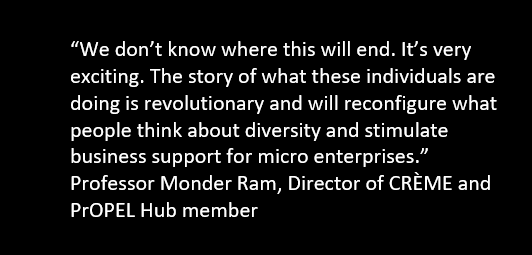What do 12 entrepreneurs, 1 university, and 1 creative industry company create?
It sounds like the start of a riddle, but the answer is…
The “P” Word.
The “P” Word launched with a bang on Thursday 23rd July 2020 with the dynamic host FUSION. 12 pioneering creatives are poised to start a 9-month leadership programme with world class contributors to enhance their productivity in the creative sector.
What started as a mainstream research project on productivity in creatives by the Centre of Research for Ethnic Minority Entrepreneurship, ‘CREME’, has now evolved into a leadership development programme rooted from the community up, led by Punch Records.
Who are these 12 entrepreneurs and what do they do?
Punch Records shone a spotlight on 12 creatives that will change the creative industries in 2021 & beyond.
The peer learning group are: Daniel Alexander, Namywa, RTKal presents: The MBC, Tarju Le’Sano The DopeRes K.I.D, YOLA Entertainment, The Gap, Know Hope, TCU – The Creative Universe, Ifa-Yoruba Contemporary Arts Trust, Wiggins Media, Yugen Arts, and last but by no means least Click Visuals.
You can view their bios, and get to know them further right here. They all used P words in their introductions highlighting what they want to gain from the programme and what they felt as integral to the growth of their industry.

So why is this so important?
“Big up the 0121, our city is built by innovators – so big up everyone joining us here today.” Tarju
These entrepreneurs represent an almost forgotten business sector. They are passionate about engaging with and helping the next generation of creatives in the West Midlands to have an easier route to their chosen paths. They want the next generation to stay in the West Midlands not to feel they have to move to London to make a career.
What was clear when listening to these artists was their huge sense of community and the integral theme of intergenerational commitment to pass lessons they learn down to upcoming artists and creatives. They all spoke of lack of infrastructure in Birmingham to support artists and were passionate about developing this.
What happens now?

What can business support providers do to ensure diverse creative industry are represented and supported? Many of these are micro businesses and not aware or eligible for traditional business support routes.
The grass roots are already here, let’s not lose them due to a lack of support and opportunities.
What will change look like?
Digitally agile sector
Organisational development of the market
Routes being made in Birmingham for the industry
Nurturing of talent
A legacy to be created for the industry
One immediate output has been the sharing of a commitment for change.
The ”P” Word illustration was unveiled (pictured above) during the launch party, could this be the picture that represents transformation? It was a huge surprise to everyone at the launch, including the participants. Elekwachi Kingsley was commissioned by Punch Records to illustrate each individual creative on the project.
If you would like further updates about ‘The “P Word’, subscribe to their Newsletter; and follow them on Twitter, Facebook & Instagram. To find out further information about CREME, please click the links
CREME – Centre for Ethnic Minority Entrepreneurs
Based in Aston Business School at Aston University, CREME delivers leading-edge expertise on business support for ethnic minority entrepreneurs. CREME has transformed the ‘perceptions’ of ethnic minority entrepreneurs by working with business policy-makers and influential organisations to engage collaboratively with overlooked or disregarded business communities. Headed by Professor Monder Ram OBE, CREME has built up an enviable reputation regionally, nationally and internationally for its pioneering research and business engagement activities, promoting diversity and enterprise
One current project that CREME is currently engaged in is “Productivity from Below”, which is funded by the ESRC.
This project uses academic research, co-produced with practitioners, to design and implement scalable policies to boost productivity by strengthening management practices in micro-businesses (with 1-9 employees). The project focuses on businesses owned and run by disadvantaged communities in the West Midlands around business support for enhancing productivity.
Academic Partners are working with Ashley Community Housing, the Bangladeshi Network, Citizens UK and Punch Records to support this project.
Learn More
Ram, M., McCarthy, I., Green, A., & Scully, J. (2022). Towards a more inclusive human resource community: Engaging ethnic minority microbusinesses in human resource development programmes targeted at more productive methods of operating. Human Resource Management Journal, 32(3), 540-554.